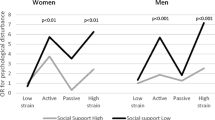Abstract
This study examines whether police officers' race is associated with their performance of duties and delivery of services. Using self-report survey methodology, officers of three different races (African-American, White, and Hispanic) evaluated their performance on forty dimensions of their work. The results indicate that race is not a significant factor in officers' self-assessments. However, the results indicated that officers with some college education and college degree (irrespective of the race) report themselves performing better on several dimensions of their work than officers with no college education.
Similar content being viewed by others
References
Alpert, G., & Moore, M. (1993) Measuring police performance in the new paradigm of policing InPerformance Measures for the Criminal Justice System: Discussion Papers from the BJS-Princeton Project. Diluio, Jr. J.J. (ed.) Washington, D.C.: Bureau of Justice Statistics, October, 1993.
Beard, E. (1977). The Black police in Washington D.C..Journal of Police Science and Administration, 5(1) 48–51.
Berg, B., Ture, E., & Gertz, M. (1984). Police riots, and alienation.Journal of Police Science and Administration, 12, 186–190.
Blackmore, J. (1974). The relationship between self-reported delinquency and official convictions amongst adolescent boys.British Journal of Criminology, 14, 172–76.
Blanchard, F.A., & Crosby, F.J. (1972).Affirmative action in perspective New York, Praeger.
California Attorney General (1973)The police in the California community Saeramento Office of Attorney General of California.
Campbell, D., & Lee, C. (1988). Self-appraisal in performance evaluation.Academy of Management Review 13(2):302–314.
Clairbone, R. (1980). How other cities put minority cops on the job.The Daily News, August 31, 1980.
Clark, J., & Tiff, L. (1966). Polygraph and interview validation of self-reported deviant behavior.American Sociological Review 31:516–23.
Felkenes, G. (1990). Affirmative action in the Los Angeles Police Department.Criminal Justice Research Bulletin 6(1990): 1–9.
Felkenes, G. (1992). Affirmative action Concept, development, and legality. In G. Felkenes & P.C. Unsinger (Eds.),Diversity Affimative Action and Law Enforcement. Charles C. Thomas Publisher, Springfield, Illinois.
Freed, D. (1986, Sep. 28), “LAPD: Despite gains, race, and bias persist.”Los Angeles Times.
Gibson, H.B., Morrison, S., & West, J.D. (1970). The confession of known offenses in response to a self-reported delinquency schedule.British Journal of Criminology 10:277–80.
Georges-Abeyie, D. (1984). Black police officers: An interview with Alfred W. Dean, Director of Public Safety, Harrisburg, Pennsylvania. In Georges-Abeyie, D. (ed.)The Criminal Justice System and Blacks. New bury Park, Calif.: Sage.
Gosnell, H.F. (1935).Negro Politicians: The Rise of Negro Politics in Chicago. Chicago: University of Chicago Press.
Grimes, J. (1969). The Black Policemen in the law enforcement. M.A. Thesis John Jay College of Criminal Justice, (p. 55).
Herbers, J. (1980). Minority groups' distrust of police found to be on the rise around the country.The New York Times. May 25, 1980, p. 16.
Hindelang, M., Hirschi, T. & Weis, J. (1981).Measuring Delinquency. Beverly Hills: Sage Publications.
Houston, J. (1995).Correctional Management. Chicago, Il. Nelson Hall.
Johnson, R. A. (1992).Applied multi variate statistical analysis. Englewood Cliffs, N. J.. Prentice Hall.
Kakar, S. (1998). Self-evaluations of police performance: An analysis of the relationship between police officers' education level and performance.Policing An International Journal of Police Strategies and Management, 21(4), 632–647.
Kelly, R., & West, Jr, G. (1973). The racial transition of a police force: A profile on white and black policemen in Washington, D.C. In J. R. Snibbe & H. M. Snibbe (eds.),The Urban Policemen in Transition: A Psychological and Sociological View. Springfield, III.: Charles Thomas, 1973, pp. 354–381.
Kephart, W. M. (1957).Racial factors and urban law enforcement. University of Pennsylvania Press.
Kim, J., & Mueller W. C. (1978)Introduction to factor analysis: What it is and how to do it. Sage Publications.
Krimmel, T. J. (1996). The performance of college-educated olice: a study of self-rated police performance measures.American Journal of Police, 15(1), 85–96.
Kuykendall, J., & David Burns (1985). The Black police officer: An historical perspective. In A. Blumberg & E. Neiderhoffer (Eds.),The ambivalent force: Perspective on the police. 3rd edition, New York: Holt, Rinehart and Winston.
Landrum, L. W. (1947) The case of Negro police.New South 11, 5–6.
Leinen, S. (1984).Black police, white society. New York University Press.
Martial, G. (1944).An American dilemma: The Negro problem and modern democracy. New York: Harper and Brothers.
Nicholas, A. (1969)Black in blue: A study of the Negro policeman New York Appleton-Century-Crofts.
Norusis, M. J. (1990).SPSS base system users's guide. Chicago, IL: SPSS Inc.
Palombo, J. B. (1992). Attitudes, training, performance, and retention of female and minority police officers. In G. Felkenes & P. C. Unsinger (eds.)Diversity affirmative action and law enforcement Charles C. thomas Publisher, Springfield, Illinois.
Roberg, R. R., & Kuykendall, J. (1997).Police Management (second edition). Roxbury Publishing Company.
Rossi, P., Berk, R., & Eidson, B. (1974).The roots of urban discontent: Public policy, municipal institutions and the ghetto. New York: John Wiley.
Siegel, L. J. (1995).Criminology: Theories, patterns, and typologies (5th edition). West Publishing Company.
Sullivan, P. S. (1988). “Minority Officers”. In R. D. Dunham & G. P. Alpert (eds.),Critical Issues in Policing. Prospectheights, IL: Waveland Press.
Skolnick, J. H., & Bayley, D. (1986).The New Blue Line. New York: the Free Press.
The National Advisory Commission on Civil Disorder Report, 1968. New York: Bantam Books.
Throstle, L. (1992). “Recruitment, Hiring, and Promotion of Women and Racial Minorities.” In G. Felkenes & P. C. Unsinger (eds.)Diversity, affimative action and law enforcement. Charles C. Thomas Publisher, Springfield, Illinois.
The President's Commission on Law Enforcement and Administration of Justice, Task Force Report, The Police, Washington, D. C., 1967.
Voss, H. (1963). “Ethnic differences in delinquency in Honolulu.”Journal of Criminal Law, Criminology, and Police Science, 54, 322–327.
Walsh, W., & Donovan, E. (1990). The supervision of police personnel, Dubuque, IA: Kendall-Hunt.
Author information
Authors and Affiliations
Additional information
Author's Note: Suman Kakar, Ph.D., is Associate Profess or at Florida International University, College of Health and Urban Affairs. University Park Campus, Miami, FL 33199.
Rights and permissions
About this article
Cite this article
Kakar, S. Race and police officers' perceptions of their job performance: An analysis of the relationship between police officers' race, education level, and job performance. J Police Crim Psych 18, 45–56 (2003). https://doi.org/10.1007/BF02802607
Issue Date:
DOI: https://doi.org/10.1007/BF02802607



